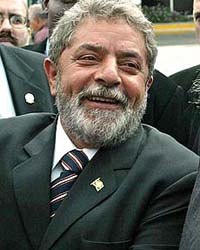Silva slams U.S. tariff on Brazil ethanol ahead of Bush visit
Brazilian President Luiz Inacio Lula da Silva said Monday that a U.S. tariff on Brazilian ethanol does not make sense and that he will complain about it to U.S. President George W. Bush when the American leader visits Brazil later this week.

Silva also said he does not think it's appropriate for him to talk with Bush about the socialist Venezuelan President Hugo Chavez, even though Bush's trip to is widely viewed by analysts and Brazil's media as an attempt to neutralize Chavez' influence in the region.
"I don't believe there's room for us to discuss problems of other countries," he said.
Bush and Silva on Friday are expected to forge an "ethanol alliance" aimed at creating quality standards for the alternative fuel, while joining forces to promote production of ethanol in nations lying between Brazil and the United States.
But the United States' US$0.54 (EUR41) per gallon tariff on Brazilian ethanol makes the sugarcane-based fuel more expensive in America, and means that American corn that could be used for animal feed is being diverted to produce ethanol, Silva said. The United States and Brazil are the planet's biggest ethanol producers, and Brazil is the largest exporter.
Silva compared the tariff that subsidizes American farmers to other agricultural trade barriers the United States and Europe have imposed, key sticking points in negotiations by the World Trade Organization for a deal that would liberalize trade across the planet and boost the international economy.
"They talk a lot about free trade, but they like to protect their own products," Silva said on his biweekly "Coffee with the President" radio program.
Silva said he will also talk with Bush about efforts to salvage the WTO talks that collapsed in discord last summer over farm subsidies and reluctance by developing nations to open their markets to rich countries.
He made the comments as negotiators from the United States, the European Union, Brazil and India were holding bilateral meetings in Geneva in an attempt to get the so-called Doha round of trade talks back on track, reports AP.
"I think we're close to a deal in the Doha round," Silva said, adding that he thinks an accord will most benefit nations like Brazil that have complained about difficulties shipping agricultural products to American and European markets.
Subscribe to Pravda.Ru Telegram channel, Facebook, RSS!





